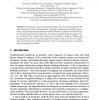Free Online Productivity Tools
i2Speak
i2Symbol
i2OCR
iTex2Img
iWeb2Print
iWeb2Shot
i2Type
iPdf2Split
iPdf2Merge
i2Bopomofo
i2Arabic
i2Style
i2Image
i2PDF
iLatex2Rtf
Sci2ools
IDEAL
2005
Springer
2005
Springer
Predictive Vaccinology: Optimisation of Predictions Using Support Vector Machine Classifiers
Promiscuous human leukocyte antigen (HLA) binding peptides are ideal targets for vaccine development. Existing computational models for prediction of promiscuous peptides used hidden Markov models and artificial neural networks as prediction algorithms. We report a system based on support vector machines that outperforms previously published methods. Preliminary testing showed that it can predict peptides binding to HLA-A2 and -A3 supertype molecules with excellent accuracy, even for molecules where no binding data are currently available.
Related Content
| Added | 27 Jun 2010 |
| Updated | 27 Jun 2010 |
| Type | Conference |
| Year | 2005 |
| Where | IDEAL |
| Authors | Ivana Bozic, Guanglan Zhang, Vladimir Brusic |
Comments (0)

